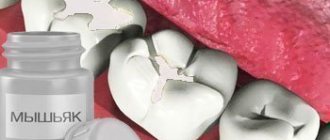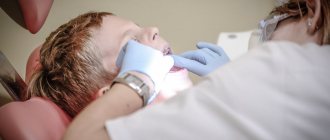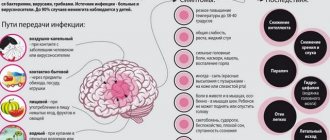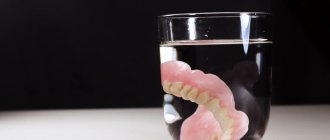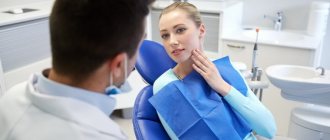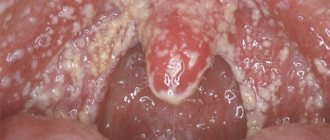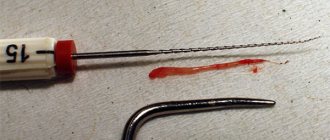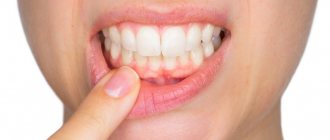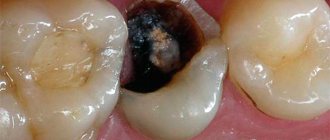What is toothache like?
The symptoms of toothache, although difficult to confuse with anything else, can manifest themselves in completely different ways in terms of intensity, duration and location.
There are the following types of toothache in medicine:
- Short-term sharp toothache while eating sweet food: serves as a signal of early stage caries, as well as erosion. You can eliminate the pain by simply rinsing your mouth. But this does not mean that you should calm down on this - because if left untreated, the pain will return, and the disease will continue to develop. A timely visit to a doctor will completely eliminate toothache due to caries and preserve healthy tooth tissue.
- Passing toothache, often after exposure to low/high temperatures: appears with medium and deep caries - when the nerve is at a close distance from the bottom of the carious cavity, which increases its susceptibility. If you put off visiting a doctor with such a toothache, inflammation of the nerve may become a natural result.
- Toothache from cold or during brushing: characteristic of increased tooth sensitivity, the presence of wedge-shaped defects, exposure of the neck of the tooth, pathological abrasion, and erosion. All these pathologies lead to thinning of the enamel and exposure of dentin, which contains the processes of nerve cells, resulting in pain. You can relieve pain with special toothpastes for sensitive teeth.
- Prolonged aching toothache is also under the influence of different temperatures: it can be caused by inflammation of the nerve. If the tooth reacts to cold, then this is serous inflammation, if it is hot, then the inflammation is purulent. In both cases, you need to contact a dental clinic as soon as possible, otherwise this may lead to complete loss of the tooth.
- Constant, acute toothache, throbbing in one tooth: in most cases, this is a sign of the development of periodontitis. With such a toothache, the gums swell and the tooth may become loose.
- Toothache when pressed, accompanied by a feeling of fullness: can be caused by chronic periodontitis, which has worsened due to stress or a cold. In this case, a granuloma or cyst forms on the root of the tooth, which can only be diagnosed using special equipment. Therefore, in this case, you should under no circumstances delay visiting a dentist, because if you ignore this toothache, gumboil or abscess will not take long to appear.
- Acute toothache at night in the entire jaw: signals diffuse pulpitis or exacerbation of chronic pulpitis - both are acute inflammation of the dental nerve. Often such toothache radiates to the ear and temple. You need to see a doctor urgently!
Negative factors beyond the patient's control
If a person does not smoke, engages in debate, and watches his diet, why do his teeth begin to rot? There may be several reasons for this:
- Bad ecology. Polluted air, poor quality water, an excess of some and a lack of other important components. Fluoride deficiency is often cited as the cause of dental problems.
- Heredity. If the parents had bad teeth or the mother did not visit the dentist during pregnancy, children often experience similar problems.
- Physiological features. Hormonal imbalance in adolescents during the growth period, in pregnant and lactating mothers.
Tooth decay is often a consequence of other diseases. Problems with periodontal tissues - gingivitis, periodontitis, periodontal disease - lead to the development of caries and cause tooth loss. If a purulent cyst forms near the root, the infection quickly spreads to the tooth. Often the deterioration of teeth is caused by diseases of the stomach, intestines, and thyroid gland.
Causes of toothache
Let us examine in more detail the reasons that provoke the appearance of various types of toothache in adults and children:
- Caries
- Exposure of dentin at the neck of the tooth
- Chips and cracks of traumatic origin
- Pulp inflammation
- Periodontitis
- Fluoride and calcium deficiency
- Wedge-shaped defect in the area of the tooth neck
- Abscess or purulent inflammation on the tooth root
- Angina and myocardial infarction
- Respiratory diseases
- Pathology of the temporomandibular joint
- Nervous system diseases
- Malignant formations in the maxillofacial area
- Severe stress
You may also experience toothache when wisdom teeth erupt; in this case, you need to consult a doctor to understand whether the tooth is developing correctly and whether there is enough space for it. In addition, one of the causes of toothache is inflammation due to poor treatment of caries and pulpitis. You may also experience toothache under the crown due to incorrect installation. Therefore, it is very important to take a responsible approach to choosing a clinic and a doctor.
If a patient has a toothache after dental treatment, then this is a normal reaction of the tooth to the intervention of a specialist. It goes away within 1-3 days. Toothache after tooth extraction is also a natural consequence of injury to surrounding tissues.
What to do if you have a toothache?
The answer to the question: “What is better for toothache?” - can be only one. This is a visit to the dental clinic. However, the time and place do not always allow this to be done without delay. In this case, you can try to relieve the pain yourself. Here are some first aid options for toothache:
- If discomfort occurs when eating food, brushing your teeth or rinsing with warm water/soda solution will help against toothache and swelling of the gums. You can also use a decoction of chamomile, mint, oregano, St. John's wort and sage.
- Refrain from chewing food with a sore tooth.
- For some time, severe toothache can be pacified by applying a piece of ice to the sore tooth.
- Acupressure of the hands in the area where the bones of the index and thumb touch will help reduce the intensity of pain. Nerves pass through this zone, and massage helps to “deceive” them, switching attention to another stream of information.
Important!
Often, with the most severe toothache in an adult, it is recommended to apply honey or cotton wool soaked in strong alcohol to the tooth so that under their influence the nerve stops sending pain impulses to the brain. But can such a compress eliminate toothache? Depends on the specific clinical case. Sometimes this is really a solution, and sometimes this method can provoke even more severe inflammation.
Before and after dental treatment at the Ilatan Clinic. Works by Zarivny S.S.
Pulsating pain in a tooth can be caused by non-dental problems.
Trigeminal neuralgia
Unbearable, throbbing pain covers the teeth on one side (on the upper and lower jaws on the right or left). At the same time, half of the head hurts, “shoots” in the ear, eye and under the jaw. In severe cases, the tongue becomes temporarily numb, the patient complains of tingling of the face and twitching of facial muscles. The pain usually appears at night. During the day, an attack can be triggered by eating, talking, brushing your teeth, combing your hair, and even yawning. Without treatment, the patient's condition worsens due to the destruction of the protective myelin sheath of the nerve. If you have the slightest suspicion of trigeminal neuralgia, consult a neurologist.
Gastrointestinal diseases
Pulsation of teeth without pain may indicate a dysfunction of the liver, diseases of the stomach and intestines. Characteristic signs of gastrointestinal pathology are a coated tongue, bad breath and an unpleasant taste in the morning, abdominal pain, flatulence, constipation or diarrhea. After successful treatment of the underlying disease, discomfort in the mouth disappears.
Sinusitis
Inflammation of the maxillary sinuses is manifested by prolonged nasal congestion, discharge of purulent mucus and headache. The patient breathes through his mouth, his face is puffy. Often, a nagging pain in the area of the maxillary sinuses radiates to the cheekbones and provokes pulsation in the teeth. An ENT doctor treats sinusitis.
If you have an acute toothache, where should you go urgently?
At home, you can reduce or stop pain for a while, but there are situations when severe toothache in an adult or child is unbearable and is accompanied by swelling or fever. In this case, you need to immediately contact the clinic, if necessary, 24 hours a day. This way, you have a much better chance of getting enough sleep, because caries can be removed in a few minutes, but you can suffer with a tooth at home for many hours. But where to go with acute toothache at night? If it is not possible to contact the dentist on duty, seek emergency help for toothache in an ambulance. Specialists will administer a pain-relieving injection, which will help you wait until your visit to the dentist.
Treatment of toothache
When a toothache occurs, it is very important not to get carried away with self-medication, since in fact this is not a treatment at all, but only a temporary solution to a problem, the development of which can lead to serious consequences. Only a specialist can diagnose the cause of inflammation and prescribe adequate treatment for toothache. It is possible that to determine the source of pain, an x-ray or examination using a radiovisiograph or 3D tomograph will first be required.
It is extremely important to establish as early as possible whether the pain is a consequence of diseases in the oral cavity, or whether it is the result of other pathologies. For example, one of the common causes of toothache is psychosomatics. Then you will need to continue treatment with a specialist of the appropriate profile.
Why do teeth rot at the gums?
Caries near the gums and on visible parts of the tooth are no different.
The reasons for its occurrence are the same, but near the gums it is more difficult to identify and treat the disease. Therefore, patients usually consult a doctor at the stage of progressive pulpitis. Timely detection helps prevent the development of caries in the gingival region. To do this, you need to periodically visit the dentist, who will correctly assess the condition of the enamel and detect the development of caries in time. Experts call gum disease a common cause of its occurrence. Food debris that accumulates in the gum pocket promotes the development of bacteria. In addition, the disease can be caused by an incorrectly installed crown, poor hygiene, or changes in the composition of saliva.
Will painkillers help?
If a very severe toothache does not go away, and massage and other non-drug methods do not help, you will have to take painkillers. There are 4 groups of drugs that are used against toothache:
Based on ibuprofen, ketoprofen, nimesulide and ketorolac:
considered one of the best for eliminating acute toothache in the jaw, they are considered non-steroidal drugs. However, these are still not completely harmless substances, since they put a strain on the kidneys and liver.
Based on paracetamol:
do not relieve inflammation, but block pain impulses sent to the brain. That is, the tooth hurts, but the person feels the pain less intensely.
Based on analgin and aspirin:
can slightly reduce pain due to the anti-inflammatory effect. However, aspirin reduces blood clotting, so you should not drink it to reduce pain after tooth extraction.
Antibiotics:
have antimicrobial properties, but are unable to quickly relieve pain. They allow you to reduce inflammation during toothache only after a long course, and after that the pain will return. Therefore, you should take antibiotics only if you have been without access to places where you go for toothache for a long time, and there is nothing other than antibiotics in your first aid kit.
It is important to understand that none of these drugs will get rid of the cause of toothache - after taking them, the intensity of the discomfort will only decrease temporarily. Many, well aware of this, continue to ignore the problem, switching to regular medication. Under no circumstances should you do this, since you will not only not eliminate the problem, but you will acquire a lot of new ones - painkillers have many limitations and negatively affect other human organs.

